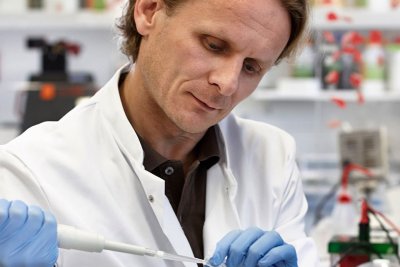News
The PROXIDRUGS research cluster receives up to EUR 15 million in support from the German Federal Ministry of Education and Research – LOEWE scientists are involved
Proteins that have spiralled out of control or are functioning incorrectly are the cause of many disease patterns. Established therapeutic approaches are usually geared towards blocking the proteins to stop the uncontrolled growth of cancer cells, for example. However, this is only possible by using classic “small” molecules in merely 20 percent of all proteins related to diseases. The remaining 80 percent cannot be reached using these treatments.
This is the starting point for the forward-looking PROXIDRUGS cluster. PROXIDRUGS managed to emerge as one of seven projects to be funded by the “Clusters4Future” competition organised by the German Federal Ministry of Education and Research and will now receive up to EUR 15 million in funding.
Scientists at the Goethe University in Frankfurt, the Technical University of Darmstadt, the University of Heidelberg, the Max Planck Institute for Biophysics in Frankfurt and the new Fraunhofer Institute for Translational Medicine and Pharmacology (the former LOEWE Centre) are together developing improved treatments for sicknesses like cancer, cardiac and infectious diseases. The new kinds of active substances are deliberately aimed at breaking down disease-related proteins in the human body. Professor Dr Ivan Đikič, the Coordinator of PROXIDRUGS and a scientist at the Frankfurt Cancer Institute (FCI) LOEWE Centre, explains, “Our bodies have a sophisticated system to dispose of faulty, superfluous or harmful proteins. We’ll make use of this system to deliberately break down disease-related proteins.” These new therapeutic approaches are based on so-called proximity induction and “allow scientists to use proteins, which could not be addressed in the past, to develop medicines,” says Professor Dr Felix Haus; he is heading the working group at the Technical University of Darmstadt and is the spokesperson for the TRABITA LOEWE cluster.
The Hesse state government welcomed the project application for the federal competition from the outset and Angela Dorn, the Minister for Science and the Arts, is particularly delighted and has congratulated those involved that they have been selected for this initial round of funding. “The project organised by the PROXIDRUGS innovative network fits in perfectly with the innovative strategy in Hesse, by creating enormous opportunities to develop innovative drugs. […] I’m particularly thrilled that projects funded by the state’s LOEWE research funding programme are some of the forerunners or are providing important complementary expertise.”



